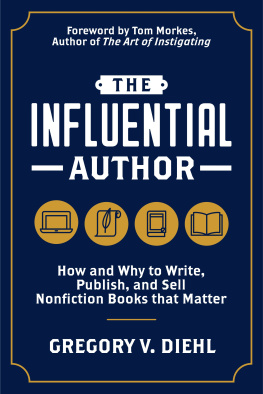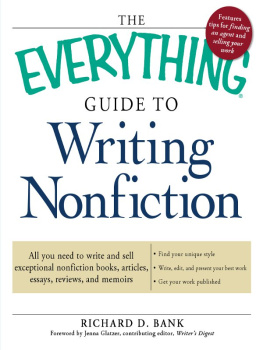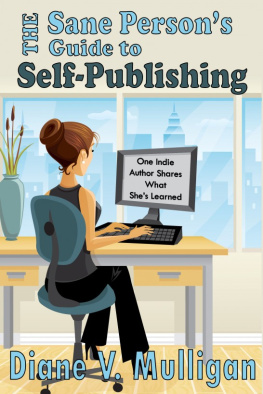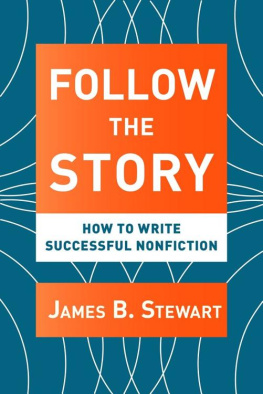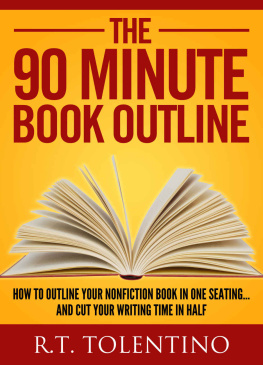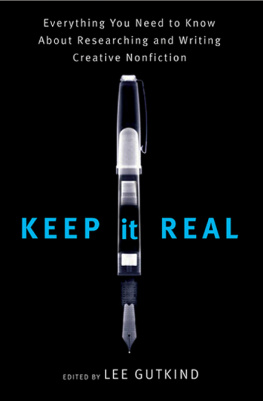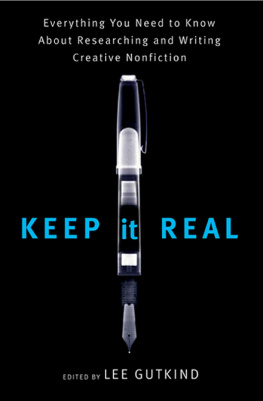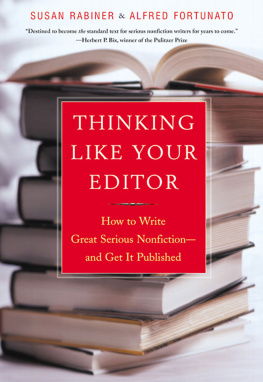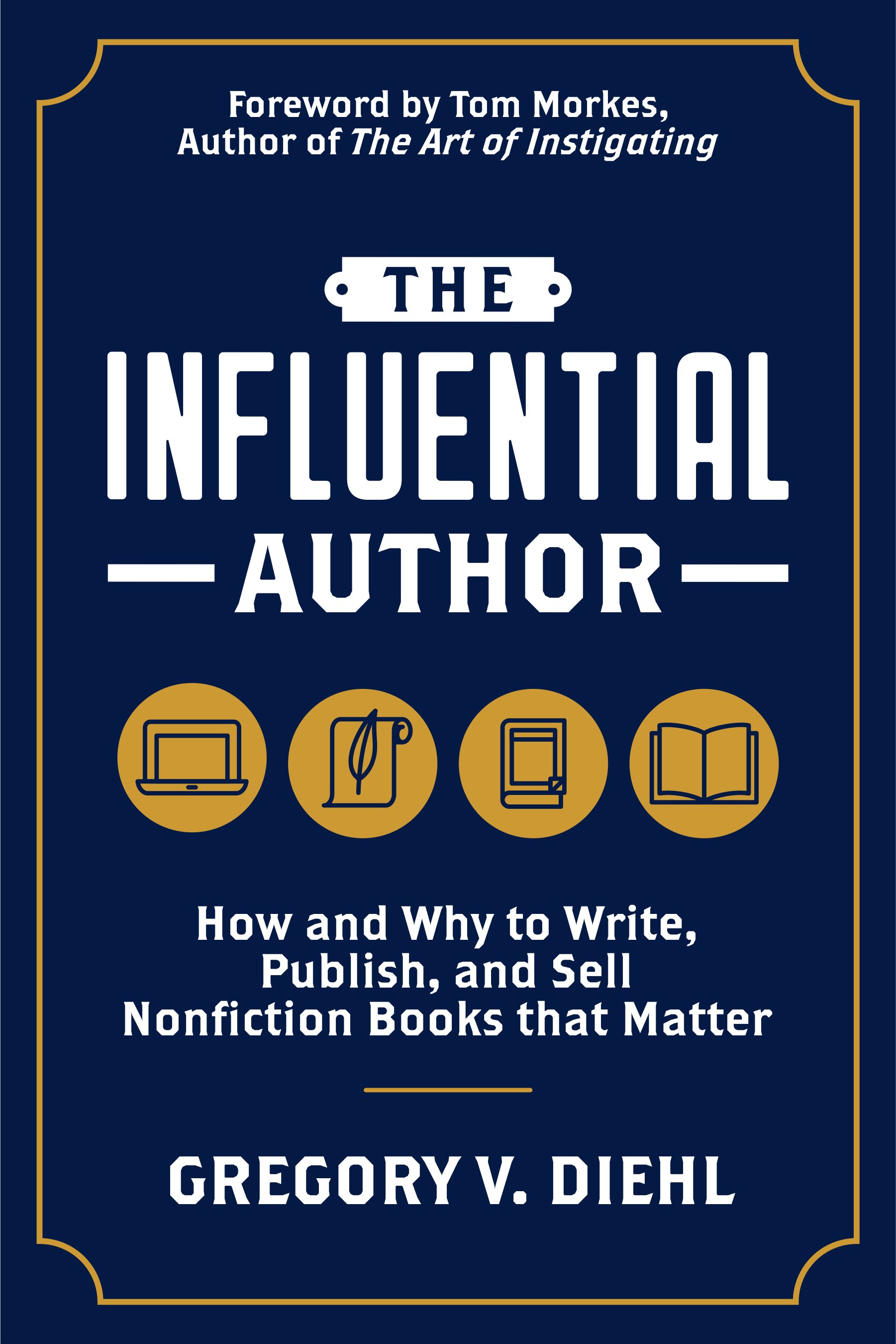
How and Why to Write,
Publish, and Sell Nonfiction
Books that Matter
By Gregory V. Diehl
Foreword by Tom Morkes
Copyright 2019 Gregory V. Diehl
All rights reserved. No part of this publication may be reproduced, distributed, or transmitted in any form or by any means, including photocopying, recording, or other electronic or mechanical methods, without the prior written permission of the publisher, except in the case of brief quotations embodied in critical reviews and certain other noncommercial uses permitted by copyright law. Any perceived slight against any individual is purely unintentional.
For permission requests, write to the publisher at contact@identitypublications.com.
Ordering Information:
Quantity sales. Special discounts are available on quantity purchases by corporations, associations, and others. For details, contact the publisher at the address above.
Orders by U.S. trade bookstores and wholesalers. Please contact Identity Publications: Tel: (805) 259-3724 or visit www.IdentityPublications.com.
ISBN-13: 978-1-945884-65-8 (paperback)
ISBN-13: 978-1-945884-66-5 (hardcover)
Library of Congress Control Number: 2018913387
Cover design and section illustrations by Resa Embutin (www.ResaEmbutin.com). Author photo credit: Lenin Lavia.
First Edition
Publishing by Identity Publications
www.IdentityPublications.com
Dedicated to every exceptional mind that has ever feared it would not be able to express its full ability to perceive the world beyond the limitations of its time.
The whole Earth is the Sepulchre of famous men; and their story is not graven only on Stone over their native earth, but lives on far away, without visible symbol, woven into the stuff of other mens lives.
Pericles (495 BC 429 BC)
If I have seen further it is by standing on the sholders [sic] of Giants.
Isaac Newton (1676)
The survival or preservation of certain favoured words in the struggle for existence is natural selection.
Charles Darwin (1871)
A man may die, nations may rise and fall, but an idea lives on. Ideas have endurance without death.
John F. Kennedy (1963)
The word is now a virus.
William S. Burroughs (1998)
An idea: a theory or an equation, might sit around unnoticed for decades, centuries, even, before its rediscovered and put to some use. Thats how it works: it makes connections with other ideas, other knowledge, gathering momentum all the time, growing exponentially if its strong enough.
K. Valisumbra (2015)
Table of Contents
Foreword
By Tom Morkes
There is no better medium for spreading an idea than a book.
I would typically explain my reasoning behind such a claim, but thanks to Gregory Diehls The Influential Author I can save you time (and the pain of redundancy) by simply pointing you to his book.
Instead, I want to focus on a simple question:
If a book can be such a powerful tool for change in the world, why dont more people write and publish?
Having worked with hundreds of authors (and aspiring authors) in various capacities over the years, it seems to me failure to launch comes down to three myths:
Myth #1: You Dont Believe You Have Anything Worth Sharing
Or you dont believe you have the skills to share it properly... or you dont believe its worth the time, money, and effort... or you dont believe, even if you do publish, that anyone will care.
When you dont believe in the work you do, you will necessarily lack the faith to bring your ideas into being. Everything in life will present itself as a great idea... for someone else.
So if youre waiting for a pat on the back or an attaboy from the crowd before you dive headfirst into your creative pursuit, I have unfortunate news for you: no one will believe in you if you dontnobody bets on the fighter who talks about his forthcoming defeat.
The only way to inspire others is to be the source of inspiration.
If youre not there yet, dont lose hope. Picking up and reading a book like this is a practical demonstration that there is a spark within you. Your next step is to kindle that into a flame that you (and others) can believe in and follow. That takes time and practice. Dont quit.
Myth #2: You Dont Know Where to Start
So you search how to write a book on DuckDuckGo and, instead of having the precise path illuminated and prepared for you, youre sucked into the infinite abyss that is the internet: a thousand contradictory ideas that all claim the same perfect outcome, each with a compelling narrative of its viability.
So, instead of moving with a purposepicking a path and taking the next stepyou get sucked into the world of the amateur critic, whose predominant concern is squabbling with others to determine the right path. Can you guess what happens next?
Nothing.
Hop onto any Facebook group for self-publishers and youll see what I mean: thousands of aspiring writers talking about writing, thinking about writing, and criticizing every resource, book, course, coach, or program thats out there to help them start writing... but never actually writing.
Heres the thing. There is no right path. Thats a myth. There are best practices (youll find them in this book), but besides that the right path is nothing more than doing the hard work thats right in front of you.
This takes focus. Its not easy. It is worth it.
Myth #3: You Dont Have Time
Youve found a way to believe in yourselfenough to get started, at leastand youve demonstrated the desire and discipline to make progress on your book. You found your focus. Things are going great. So great, in fact, that you decide to give yourself a break. Just this week for the holidays. Then for the month because of an urgent matter at work. Then for the next quarter because your family needs you.
Then for years, because life is full of plug-and-play excuses.
Heres the deal: nothing worthwhile is easy. Worth is manifested through work. And writing a book thats worth reading is some of the hardest intellectual work anyone can undertake. So dont be surprised if you want to take a break or extend your break (indefinitely). Youre human.
Heres the solution:
First, remember: youve come this far. You owe it to yourself to finish and ship what you started. You owe it to others, too.
Second, if youre considering taking a break, dont. In fact, do the opposite. Write twice as many words today; finish an extra chapter this week; rewrite the entire thing one more time this month. Whatever your tired, uninspired self wants to do, do the opposite (unless its writing, then do that).
Third, if you took a decade-long hiatus but still have a whisper of a desire left inside you, sit down for an afternoon and read what youve written and do nothing more. Do this every afternoondont stop. The human brain is a goal-oriented, organizational machine that seeks to reduce pain and increase pleasure. If youre fighting your own nature, unless you have the will of a saint you will lose. So stop trying to fight yourself by saying I need to write or I need to finish this. Youll lose. Instead, put yourself in a position where the primary (or better yet, only) thing youre consuming is the book youre writing. Eventually, youll grow so tired of reading your half-baked ideas youll find it easier to write than not.

